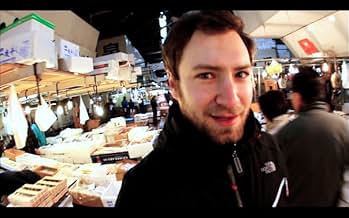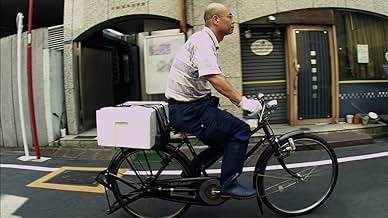A documentary on 85-year-old sushi master Jiro Ono, his renowned Tokyo restaurant, and his relationship with his son and eventual heir, Yoshikazu.A documentary on 85-year-old sushi master Jiro Ono, his renowned Tokyo restaurant, and his relationship with his son and eventual heir, Yoshikazu.A documentary on 85-year-old sushi master Jiro Ono, his renowned Tokyo restaurant, and his relationship with his son and eventual heir, Yoshikazu.
- Awards
- 3 wins & 12 nominations total
Takashi Ono
- Self
- (uncredited)
Featured reviews
I was thoroughly charmed by the film. When I read the synopsis, I thought I would be bored to tears. But it's a lovely, poignant, challenging documentary about excellence, discipline, vocational call, tenacity. The film challenged me to think about my own persistence, an ongoing striving to improve and grow, doing work for the love of it and much less so for the financial gain. the documentary highlights the ability to succeed after incredible hardship, and some would say, cruelty. The cinematography was elegant, the music varied and interesting, the precision of the art of making sushi, the rigor and discipline to do it well, the requirement to be surrounded by others who always want to excel. A wonderful film and I'll see it again...and again. It even made me want to eat sushi...which I never do.
When I got the invitation to go to this film, I was extremely hesitant and worried as to what I was going to be viewing. Even to go so far as to accept the impending nap I was about to have.
I was sorely mistaken about getting a nap. From the very beginning the story and life lessons presented were gripping. True respect for the dedication, hard work and absolute presence of mind to clear away all the minutiae that many of us get caught up in to focus on the details that are so very important.
I have actually seen action films with more lulls and uninteresting parts then what I watched in this film. It's a great story.
I was sorely mistaken about getting a nap. From the very beginning the story and life lessons presented were gripping. True respect for the dedication, hard work and absolute presence of mind to clear away all the minutiae that many of us get caught up in to focus on the details that are so very important.
I have actually seen action films with more lulls and uninteresting parts then what I watched in this film. It's a great story.
This is a movie about food, but it's much deeper in its story and content. I was truly inspired by a man's pursuit of perfection, the dedications of the understudies, the family dynamic between father and son, and the cultural beauty of Japanese crafts. Yes there are shots of "food porn" woven in, but the movie is charming and much deeper than slow-motion food shots (not that I'm complaining, some shots are stunning).
The young director has good command of the camera, and drives the movie through interviews. People in the theater were applauding at the end. I can't wait to get the DVD.
The young director has good command of the camera, and drives the movie through interviews. People in the theater were applauding at the end. I can't wait to get the DVD.
Located in a downtown Tokyo subway station, Sukiyabashi Jiro is an inconspicuous subterranean restaurant with just ten counter seats, yet it has the distinction of being the only sushi restaurant with a three-star Michelin rating. David Gelb's meticulously produced 2012 documentary tells the story of Jiro Ono, an octogenarian perfectionist whose constant striving for culinary transcendence has made him legendary among epicureans in the know. He loves his job, as he readily admits upfront, and while a model of stoic diligence and invariable routine, Ono does show his adoration in unexpected ways that manifest themselves through the unassuming pride he takes in his work. He even imagines new sushi creations in his sleep, thus the title. Such an unwavering quest does take its toll on his two sons who must find their way out of his shadow.
His younger son Takashi managed to escape the constant glare of his father by running his own premium sushi restaurant in the Roppongi Hills area of Tokyo, one that doesn't bother to compete with his father's. His older son Yoshikazu, however, bears the burden of the family legacy as the one to carry on his father's standards after he retires. Over fifty and still an apprentice, Yoshikazu patiently waits for his turn at running the flagship restaurant foregoing earlier dreams of becoming a race car driver. Since his father suffered a heart attack at seventy, he has taken over the critical task of getting the best fish possible at the world-renowned Tsukiji fish market. Gelb does a particularly nice job of showing the hurly-burly atmosphere of the pre-dawn tuna auctions and the lives of the men running the tiny stalls selling fresh seafood of all kinds. Perhaps by design, the film is comparatively more opaque in having us understand the genesis of the elder Ono's drive toward perfection.
While one contributing factor was the absence of Ono's father's absence, it is unclear who actually did influence him to become a sushi chef. There is also hardly a mention of the chef's wife, even though there is an extended passage of a reunion with his childhood pals who characterize him as something of a bully. Interviews with former co-workers shed some light onto the chef's stoicism. In fact, one of Japan's better known food critics admits to being intimidated by patronizing Ono's sushi bar due to the master's overwhelming artistry and attention to detail. Toward that end, I would have liked to have seen more scenes focused on the actual preparation of the sushi rather than simply admiring them on the counter once they are finished. Still, this is a unique look into a man who has not gone gentle into the good night in his quest for the perfect piece of sushi.
His younger son Takashi managed to escape the constant glare of his father by running his own premium sushi restaurant in the Roppongi Hills area of Tokyo, one that doesn't bother to compete with his father's. His older son Yoshikazu, however, bears the burden of the family legacy as the one to carry on his father's standards after he retires. Over fifty and still an apprentice, Yoshikazu patiently waits for his turn at running the flagship restaurant foregoing earlier dreams of becoming a race car driver. Since his father suffered a heart attack at seventy, he has taken over the critical task of getting the best fish possible at the world-renowned Tsukiji fish market. Gelb does a particularly nice job of showing the hurly-burly atmosphere of the pre-dawn tuna auctions and the lives of the men running the tiny stalls selling fresh seafood of all kinds. Perhaps by design, the film is comparatively more opaque in having us understand the genesis of the elder Ono's drive toward perfection.
While one contributing factor was the absence of Ono's father's absence, it is unclear who actually did influence him to become a sushi chef. There is also hardly a mention of the chef's wife, even though there is an extended passage of a reunion with his childhood pals who characterize him as something of a bully. Interviews with former co-workers shed some light onto the chef's stoicism. In fact, one of Japan's better known food critics admits to being intimidated by patronizing Ono's sushi bar due to the master's overwhelming artistry and attention to detail. Toward that end, I would have liked to have seen more scenes focused on the actual preparation of the sushi rather than simply admiring them on the counter once they are finished. Still, this is a unique look into a man who has not gone gentle into the good night in his quest for the perfect piece of sushi.
A lingering, sentimental look at the mentality and habits of Jiro Ono, legendary sushi chef and Japanese national treasure. The long, personal chats with Jiro and sons, plus an exhaustive investigation into every aspect of his business, are balanced by an overly generous dose of shallow focal-range, slow-motion food porn. Like many stereotypical wise men of his age and nationality, the old master also has plenty of sharp, stirring wisdom to impart. Though he doesn't come right out and say it, it's easy to see the parallels he hopes you'll draw between his dedication to the kitchen and the nuances of a rewarding life, and my breath caught in my throat on more than one occasion. A great vehicle for deep immersion into a very traditional Japanese culture, this is far deeper and more rewarding than it initially lets on.
Did you know
- TriviaIdeally, the components of sushi should be served at two different temperatures. The rice should be body temperature for best rolling and pressing qualities, and the topping (usually fish) should be room temperature for best flavor. The apprentice preparing the rice places it in an insulated container to keep it at the correct temperature.
- Crazy creditsIn the Special Thanks section, "The Tsukiji Fish Market" is listed twice.
- ConnectionsEdited into Independent Lens: Jiro Dreams of Sushi (2013)
- SoundtracksConcerto for Violin and Orchestra In D, Opus #5: I, Allegro Moderato, Cadenza
Written by Pyotr Ilyich Tchaikovsky
Performed by Jascha Heifetz, London Philharmonic Orchestra and John Barbirolli
- How long is Jiro Dreams of Sushi?Powered by Alexa
Details
- Release date
- Country of origin
- Official sites
- Language
- Also known as
- Nghệ nhân Sushi
- Filming locations
- Production companies
- See more company credits at IMDbPro
Box office
- Gross US & Canada
- $2,552,478
- Opening weekend US & Canada
- $42,035
- Mar 11, 2012
- Gross worldwide
- $2,692,864
- Runtime
- 1h 21m(81 min)
- Color
- Sound mix
- Aspect ratio
- 1.78 : 1
Contribute to this page
Suggest an edit or add missing content




















